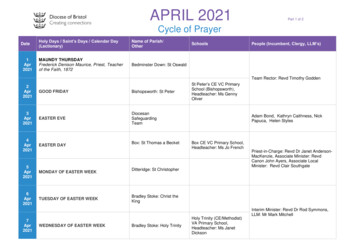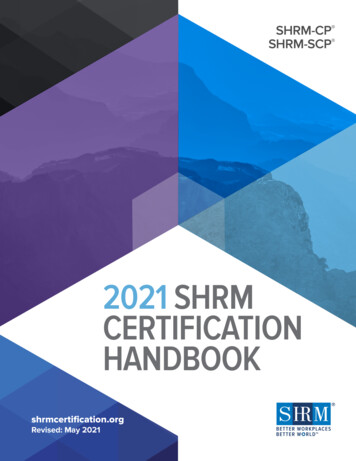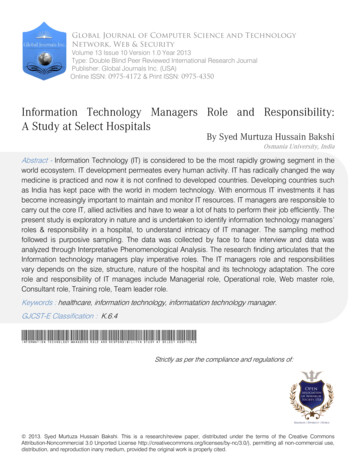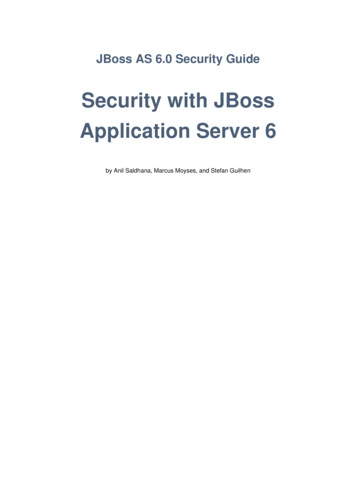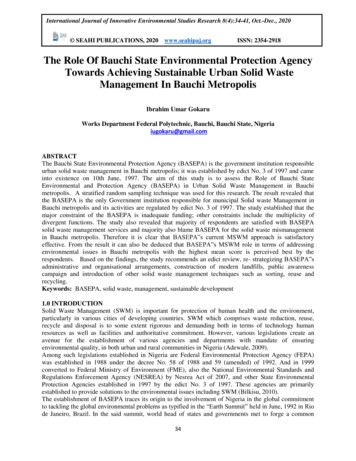
Transcription
International Journal of Innovative Environmental Studies Research 8(4):34-41, Oct.-Dec., 2020 SEAHI PUBLICATIONS, 2020 www.seahipaj.orgISSN: 2354-2918The Role Of Bauchi State Environmental Protection AgencyTowards Achieving Sustainable Urban Solid WasteManagement In Bauchi MetropolisIbrahim Umar GokaruWorks Department Federal Polytechnic, Bauchi, Bauchi State, Nigeriaiugokaru@gmail.comABSTRACTThe Bauchi State Environmental Protection Agency (BASEPA) is the government institution responsibleurban solid waste management in Bauchi metropolis; it was established by edict No. 3 of 1997 and cameinto existence on 10th June, 1997. The aim of this study is to assess the Role of Bauchi StateEnvironmental and Protection Agency (BASEPA) in Urban Solid Waste Management in Bauchimetropolis. A stratified random sampling technique was used for this research. The result revealed thatthe BASEPA is the only Government institution responsible for municipal Solid waste Management inBauchi metropolis and its activities are regulated by edict No. 3 of 1997. The study established that themajor constraint of the BASEPA is inadequate funding; other constraints include the multiplicity ofdivergent functions. The study also revealed that majority of respondents are satisfied with BASEPAsolid waste management services and majority also blame BASEPA for the solid waste mismanagementin Bauchi metropolis. Therefore it is clear that BASEPA‟s current MSWM approach is satisfactoryeffective. From the result it can also be deduced that BASEPA‟s MSWM role in terms of addressingenvironmental issues in Bauchi metropolis with the highest mean score is perceived best by therespondents. Based on the findings, the study recommends an edict review, re- strategizing BASEPA‟sadministrative and organisational arrangements, construction of modern landfills, public awarenesscampaign and introduction of other solid waste management techniques such as sorting, reuse andrecycling.Keywords: BASEPA, solid waste, management, sustainable development1.0 INTRODUCTIONSolid Waste Management (SWM) is important for protection of human health and the environment,particularly in various cities of developing countries. SWM which comprises waste reduction, reuse,recycle and disposal is to some extent rigorous and demanding both in terms of technology humanresources as well as facilities and authoritative commitment. However, various legislations create anavenue for the establishment of various agencies and departments with mandate of ensuringenvironmental quality, in both urban and rural communities in Nigeria (Adewale, 2009).Among such legislations established in Nigeria are Federal Environmental Protection Agency (FEPA)was established in 1988 under the decree No. 58 of 1988 and 59 (amended) of 1992. And in 1999converted to Federal Ministry of Environment (FME), also the National Environmental Standards andRegulations Enforcement Agency (NESREA) by Nesrea Act of 2007, and other State EnvironmentalProtection Agencies established in 1997 by the edict No. 3 of 1997. These agencies are primarilyestablished to provide solutions to the environmental issues including SWM (Bilkisu, 2010).The establishment of BASEPA traces its origin to the involvement of Nigeria in the global commitmentto tackling the global environmental problems as typified in the “Earth Summit” held in June, 1992 in Riode Janeiro, Brazil. In the said summit, world head of states and governments met to forge a common34
Gokaru . Int. J. Innovative Environ. Studies Res. 8(4):34-41, 2020approach in solving world environmental problems and achieving a global sustainable development.BASEPA was created so as to employ sound environmental management principles and practices and toinitiate appropriate management programs, policies and legislations in partnership with relevantstakeholders (National and International) for sustainable development”.2.0 LITERATURE REVIEWThe Municipal solid waste management process involves a range of activities which encompass:generation, collection and storage, transport, recycling, reclamation, reduction, sale of recoveredresources, composting and disposal (Dawnarain, 2004). Personalities associated with municipal solidwaste management A wide range of individuals, groups and organisations are concerned with MunicipalSolid Waste Management as service users, service providers, intermediaries and/or regulators. Usmanand Mohammed (2012) stated that solid waste management in Bauchi metropolis is handled by bothformal and informal sectors; thus:i) BASEPA: is responsible for monitoring and regulating the activities of the private companies as well ascollection and disposing of heap of refuse, street sweeping, managing landfills/ dump sites, establishmentof performance standards and enforcing waste management regulations.ii) Cosmopolitan Cleaners: a private waste collection company is responsible for street cleaning andcollection of waste dumps at the streets every day. The operation is usually along the dual carriage waysin the metropolis which consist of the high density areas. People dump their waste every morning at streetand road sides.Bilkisu (2010) studied the effectiveness of Bauchi State Environmental Protection Agency (BASEPA) inMunicipal Solid Waste Management in Bauchi metropolis. The study revealed that BASEPA is the onlyGovernment institution responsible for municipal Solid waste Management in Bauchi metropolis, morethan half of the respondents (57.9%) ware not satisfied with BASEPA‟s solid waste management servicesand most of the respondents also blame it for the poor solid waste management in the study area. Thestudy established that the major constraint of the BASEPA is inadequate funding. Other constraintsinclude the multiplicity of divergent functions. Based on the findings, the study recommends an edictreview, re- strategizing BASEPA‟s administrative and organizational arrangements, construction ofmodern landfills and introduction of other solid waste management techniques such as sorting andrecycling.Most relevant authorities prioritized SWM as a major effort in ensuring environmental wellbeing andaesthetics. A mandate is an official order or authority to carry out a policy or course of action, it is alsoknown as a decree, edict, commission or injunction. Thus, the role of BASEPA with respect to MSWM inBauchi metropolis is enshrined in the edict No. 3 of 1997. Under the said edict, BASEPA is the soleagency responsible for all matters relating to environmental protection, sanitation and environmentalresearch and policy. As the custodian of the environment in the whole state, BASEPA is responsible forthe management of solid waste in residential and commercial areas. However, according to themanagement of BASEPA, as revealed in the interview, the Abubakar Tafawa Balewa University and thestate specialist hospital waste management responsibilities are not under the jurisdiction of BASEPA.Section 10 of the edict deals with the powers of the agency, with respect to MSWM, subsection 5 statesthat, the agency can enter into agreement with any public or private organization and individuals todevelop, utilize, coordinate and share environmental monitoring programmes and biological effects ofvarious activities on the environment.2.1THE ROLE OF OTHER SERVICE PROVIDERS IN URBAN SOLID WASTEMANAGEMENT2.1.1 Non-governmental organisationsNon-governmental organisations (NGOs) operate between the private and governmental realms.Originating outside of the communities in which they work, NGOs are motivated primarily byhumanitarian and/or developmental concerns rather than an interest in service improvement for their ownmembers. The self-creation of meaningful employment for members may also be a motivation for NGO35
Gokaru . Int. J. Innovative Environ. Studies Res. 8(4):34-41, 2020formation. NGOs may help increase the capacity of people or community groups to play an active role inlocal solid waste management by contributing to: people‟s awareness of waste management problems, organisational capacity and the formation of community-based organisations (CBO), channels of communication between CBO and government authorities, CBO‟s voice in municipal planning and implementation processes, technical know-how of locally active CBO, and Access to credit facilities.2.1.2 Local GovernmentLocal government authorities are generally responsible for the provision of solid waste collection anddisposal services. They become the legal owner of waste once it is collected or put out for collection.Responsibility for waste management is usually specified in bylaws and regulations and may be derived,more generally, from policy goals regarding environmental health and protection. Besides their legalobligations, local governments are normally motivated by political interests. User satisfaction withprovided services, approval of higher government authorities and financial viability of the operation areimportant criteria for successful solid waste management from the local government perspective.2.1.3 National Government:National governments are responsible for establishing the institutional and legal framework for MSWMand ensuring that local governments have the necessary authority, powers and capacities for effectivesolid waste management. In many countries, responsibility is delegated without adequate support tocapacity building at the local government level. To assist local governments to execute their MSWMduties, national governments need to provide them with guidelines and/or capacity-building measures inthe fields of administration, financial management, technical systems and environmental protection. Inaddition, national government intervention is often required to solve cross-jurisdictional issues betweenlocal government bodies, and to establish appropriate forms of association when as in most metropolitanareas effective waste management calls for the collaboration of several local bodies (Schuebeler, 1996).2.1.4 Private Sector Enterprises:The formal private sector includes a wide range of enterprise types, varying from informal microenterprises to large business establishments. As potential service suppliers, private enterprises areprimarily interested in earning a return on their investment by selling waste, collection, transfer,treatment, recycling and/or disposal services. Operating in various forms of partnership with the publicsector, they may provide capital, management and2.1.5 Informal Private SectorThe informal private sector comprises unregistered, unregulated activities carried out by individuals,families, groups or small enterprises. The basic motivation is self-organised revenue generation; informalwaste workers are often driven to work as waste collectors or scavengers by poverty and the absence ofmore attractive employment possibilities. In some cases, informal waste workers belong to religious, casteor ethnic minorities and social discrimination is a factor which obliges them to work under completelyunhygienic conditions as waste collectors or sweepers. Their association with an activity which the publicperceives to be filth-related tends, at the same time, to perpetuate discrimination against them. Informalwaste workers usually live and work under extremely precarious conditions.2.1.6 External Support Agencies:Numerous bilateral and multilateral external support agencies (ESAs) are engaged in supporting MSWMin low-income countries. While some ESAs have acquired considerable expertise in the area of wastemanagement, MSWM is often a component within a broader development programme aimed atimproving urban management capacities and/or urban environmental protection (Schuebeler, 1996).3.0 RESEARCH METHOLOGYQuantitative method of research was adopted. Being the most proficient and accurate methods andacceptable globally. This was derived from primary and secondary sources. The primary data wasgenerated using two sets of questionnaires which provided information on the status of BASEPA policy36
Gokaru . Int. J. Innovative Environ. Studies Res. 8(4):34-41, 2020implementation in the State. The sampling technique adopted was stratified random sampling. Thesecondary data was sourced from BASEPA, National Population Commission and NESREA, Bauchi stateministry of lands and survey, and the Bauchi State Urban Development Board. Literature materials on theother hand were sourced from books, journals, published and unpublished texts, documents, magazinesconference articles, and the internet.Figure 3.1: Bauchi Metropolis Showing the WardsSource: Modified from Bauchi Street Guide Map (2003)37
Gokaru . Int. J. Innovative Environ. Studies Res. 8(4):34-41, 20204.0 DISCUSSION OF RESULTSFigure 4.1 Names of the government institution responsible for urban solid waste managementFigure 4.1 indicates that 75% of the respondents answered the question correctly by stating BASEPA,18% wrote Cosmopolitan Cleaners which is the popular private waste handling company in the study area7% indicate others institutions responsible urban solid waste management. Overall, the result indicatesthat the majority of the respondents know there is an agency responsible for municipal solid wastemanagement in the study area.180160140120Series 3100Series 280Series 16040200BINBURIEDBURNTPUBLIC DUMPFigure 4.2 Method of solid waste disposal in Bauchi metropolisSource: Field survey, 201738
Gokaru . Int. J. Innovative Environ. Studies Res. 8(4):34-41, 2020The result indicates that most of the respondents dispose solid wastes in waste bins which are situatedwithin the houses. This is the manner in which the law states that waste should be disposed. Sections 27and 28 of the BASEPA edict states clearly that every owner or occupier of a tenement shall provide adustbin outside the tenement to be used for disposing waste and no person shall burn or cause to be burntor any tenement waste of any description.According to Babanyara and Bogoro (2011), the need for individual on-site solid waste storage facilitiesin every household is important because, the waste dispose in open dumps and road side and open spacesin general are usually the ones that overflow and litter the place constituting nuisance to the public andjeopardising evacuation efforts. For instance, there were many reported cases of fire outbreaks caused byrefuse burning within or near residential buildings. Also, according to Nshimirimana (2004), whenhousehold waste disposal practices are known, it would be easier to introduce measures to reduce theamount of waste generated by the affected community5.0 CONCLUSIONThe findings of this study reveals that BASEPA is the sole government agency responsible for all mattersrelating to environmental protection, sanitation and environmental research in Bauchi metropolis and itsmandate is enshrined in the edict No.3 of 1997. It can therefore be concluded that BASEPA‟s functionsare multiple and divergent, also, the edict guiding municipal solid waste management in Bauchimetropolis is obsolete/outdated.Finally, the findings revealed that majority of respondents cite inadequate funds as the major constraintsto MSWM and a conclusion is made that inadequate funds is the ultimate hindrance to effective municipalsolid waste management in Bauchi metropolis.5.1 RECOMMENDATIONSBased on the findings of this research, the following are recommended; The edict guiding the conduct of BASEPA needs to be reviewed in order to strengthen its roleespecially with regards to urban solid waste management. Other management techniques like sorting, re use, recycling needs to be introduced by BASEPAif effective municipal solid waste management is to be achieved. This can be achieved in theshort run by partnering with the Bauchi state waste recycling company in the area of recycling. Modern landfills should be constructed by the government so as to accommodate the increasingquantity of waste generated and checked the negative consequence of open dumping. Awareness campaigns should be undertaken regularly in order to sensitise the public on the needto properly manage their waste and the consequences of not doing so. This can be achievedthrough media jingles, seminars and workshops.REFERENCESAbebe Tegegne. 2006. The Involvement of Micro and Small Enterprises in Solid Waste ManagementServices in Addis Ababa: The Case of Bole and Arada Sub-cities, Ethiopia.Adewole, T. A. “Waste Management towards Sustainable Development in Nigeria: A CaseStudyof Lagos State,” International Non Governmental Organization (NGO) Journal, Vol. 4, No. 4,2009. pp. 173-179.Asnani, P.U. 2009. Solid waste management, In India infrastructure report 2006, New Delhi: 3i Network,Oxford, pp. 160–189.Alemayehu Addis. 2007. Hand Book on General Principles to Solid Waste Management. Megapublishing Enterprise, Addis Ababa.Alege, P.O. and Ogundipe, A.A. (2013), “Environmental quality and economic growth in Nigeria: Afractional cointegration analysis”, International Journal of Development and Sustainability, Vol.2 No. 2 (In Press).39
Gokaru . Int. J. Innovative Environ. Studies Res. 8(4):34-41, 2020Ajibuah b. J. And Terdoo Fansen (2013) "pattern and disposal methods of municipal waste Generation inKaduna metropolis of Kaduna state, Nigeria", International Journal of Education andResearch, Vol. 1 No. 12 December 2013.Bilkisu, A. B. (2017) “ Perceptual assessment of effectiveness of the Bauchi state environmentalprotection agency in municipal solid waste management in Bauchi metropolis, Nigeria”,Masters theses, ABU Zaria.Bogoro,A. G., Ali, C., Bukar, (2012) “ Women and Solid Waste Segregation in Bauchi Nigeria”,Journal of Environment and Earth Science www.iiste.org ISSN 2224-3216 (Paper) ISSN2225-0948 (Online) Vol 2, No.8, 2012.Bogoro A. G. (2017) “Appraisal of solid waste collection systems in Bauchi Metropolis” Journalof Scientific Research and Studies Vol. 4(12), pp. 373-384, December, 2017 ISSN 2375-8791Copyright 2017.Chukwunonye, E. (2010) “Analysis Of Barriers And Success Factors Affecting The Adoption OfSustainable Management Of Municipal Solid Waste In Abuja, Nigeria. University ofWolverhampton, United Kingdom.Degnet Abebaw. 2003. Determinants of Solid Waste Disposal Practices in Urban Areas ofEthiopia: A Household-level Analysis. Project Muse Scholarly Journals, EthiopianEconomic Association/Ethiopian Economic Policy Research Institute, vol. xxivEnger,D., and Smith, A. 2008. Environmental Science a Study of Interrelationship. 11th edition,McGraw Hill International Edition .USA, European Environment Agency, Copenhagen,Denmark. "Environmental Quality (definition)." Glossary. Environmental Terminology andDiscovery Service. Accessed 2012-06-18.Federal Negarit Gazeta. 2007. Solid Waste Proclamation Number 513/2007, Ethiopia.Haruna A. U., Sadiyya M. I. (2017) “ Solid Waste Management Strategy Gaps Experienced ByThe Residence of Bauchi (Traditional) Walled city, Bauchi Metropolis, Nigeria”International Journal of Scientific & Engineering Research Volume 8, Issue 5, May-2017 1473ISSN 2229-5518.Getahun, T., Mengistie, E., Haddis, A.Van der Bruggen, B. 2012.Municipal Solid Waste Generation inGrowing Urban areas in Africa: Current Practices and Relation toSocioeconomic Factorsin Jimma, Ethiopia. Environmental Monitoring andAssessment, 1-9.Guerrero, L.A., Ger., G and William, H. 2012. Solid Waste Management challenges for citiesin developing countries. Waste Management: Harvard University Press.Johnson, D.L., (1997) "Meanings of environmental terms." Journal of Environmental quality. 26: 581-89.Justine, A. 1993. Community Based Solid Waste Management and Water Supply Projects,Problems and Solutions Compared. Urban Waste Expertise Programme. CommunityParticipation in Waste Management. UWEP Working Document 2.Nabiha, A. A. (2017) “Stakeholder Strategies for Solid Waste Management in Bauchi, Nigeria” Msc.Theses, ATBU, Bauchi, Nigeria.National Population Commission, (2010). Population Distribution by Sex, State, LGA and SenatorialDistrict. Retrieved from NPC Federal Republic of Nigeria.Massoud M. (2017) Public-private partnerships for solid waste management services.Department of Civil and Environmental Engineering, American University of Beirut, POBox 11-0236, Bliss Street, Beirut, Lebanon.Mugenda, O. M. and Mugenda, A. G. (Eds.) (1999). Research Methods, Quantitative and QualitativeApproaches. Nairobi, Kenya: African Center for Technological Studies.Minghua, Z., Xiumin, F., Rovetta, A., Qichang, H., Vicentini, F., Bingkai, L., Giusti, A., Yi, L.,2009. Municipal solid waste management in Pudong New Area, China. Journal of WasteManagement 29, 1227–1233.Nabegu, A.B and Mustapha, A. (2015). Institutional Constraints to Municipal Solid WasteManagement in Kano Metropolis, Nigeria. International Journal of InnovativeEnvironmental Studies Research. 3(3),13-21. Retrieved from www.seahipub.org.40
Gokaru . Int. J. Innovative Environ. Studies Res. 8(4):34-41, 2020NEST. “Nigeria‟s Threatened Environment: A National Profile,” Environmental Study/ActionTeam (NEST), Ibadan, 1991.Srinivas, H. 2006. „Solid Waste Management‟, http://www.gdrc.org/eum/waste DateaccessedSeptember, 2014.Solomon Asrat. 2009. Solid Waste Management: A Case Study of Household Solid Waste Managementin Arada Sub-City, Addis Ababa, Ethiopia.Tchobanoglous, G., Theisen, H. and Vigil, S. 1993. Integrated Solid Waste Engineering Principles andManagement issues. McGraw-Hill Publishing Company, USA.UNEP (United Nation Environment Programme). 1996. International Source Book on EnvironmentallySound Technologies for Municipal Solid Waste Management. UNEP Technical Publication.Tokyo, Japan.NISEPA/UNDP. “Niger State Framework for Integrated Sustainable Waste Management,”NigerState Strategic Waste Management Framework,41
urban solid waste management in Bauchi metropolis; it was established by edict No. 3 of 1997 and came into existence on 10th June, 1997. The aim of this study is to assess the Role of Bauchi State Environmental and Protection Agency (BASEPA) in Urban Solid Waste Management in Bauchi metropolis.



